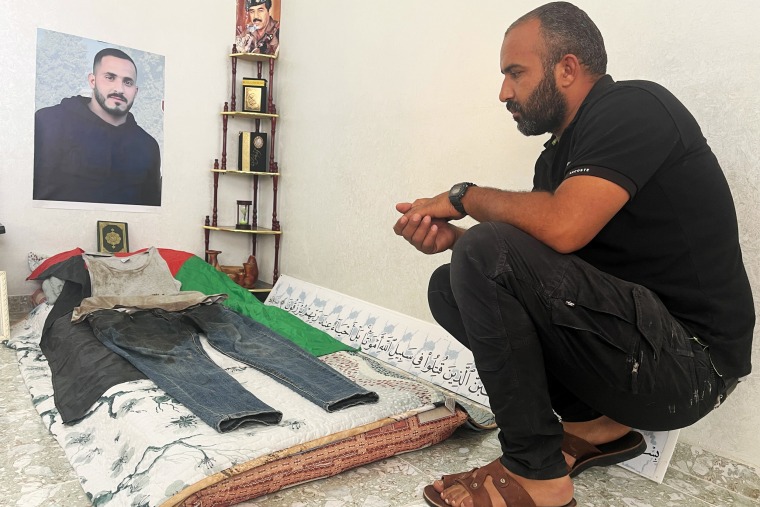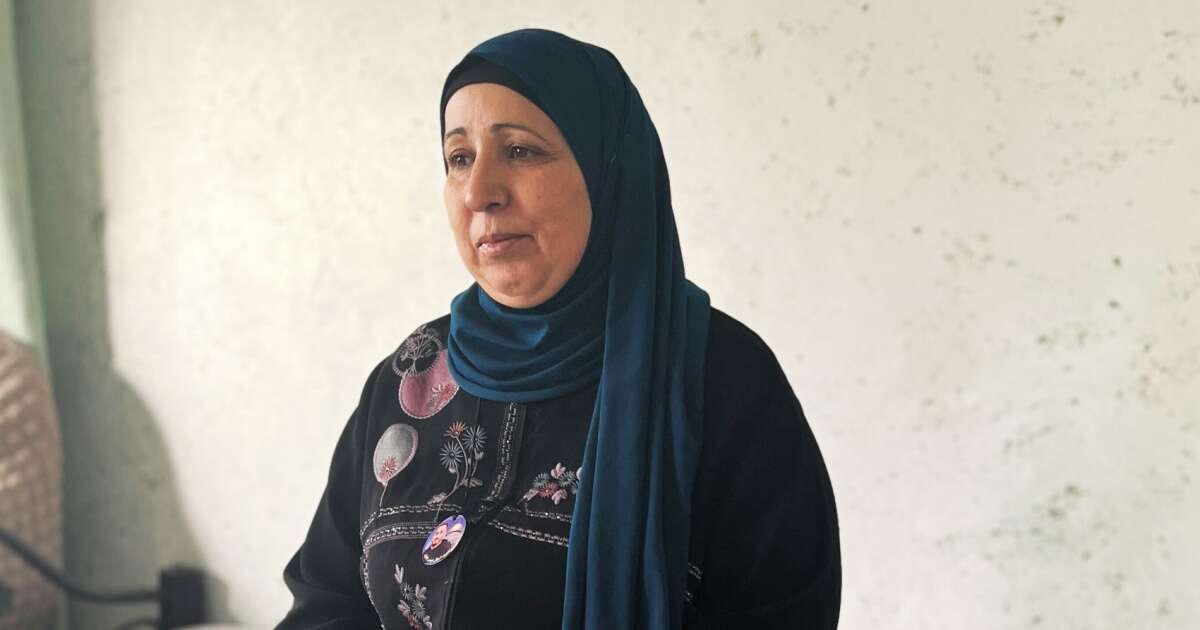TEKOA, West Bank — Half an hour before Eisa Jebril was killed, his mother, Samiha, was rolling him stuffed grape leaves. It was a dish he loved, but one she would never make for him again — the next time she saw him, he had been shot through the head, her family said, by an Israeli settler dressed as a soldier.
“I was there with him. I carried him. He was dead on the spot,” his brother Murad, 35, told NBC News on Wednesday in the living room of their neat hillside home in the occupied West Bank.
In one corner, his brother’s clothes are laid out into a shrine, still caked in blood from his fatal shooting on Oct. 13. Eisa, 27, was a trained engineer, and the memorial is dotted with artifacts from his life: a well-used laptop, three copies of the Quran and the Palestinian flag he was carrying when he was shot.

Eisa’s killing, near their village of Tekoa, is part of what the United Nations, human rights groups and locals say is a surge of violence by extremist Israeli settlers and security forces against Palestinians in the West Bank since Oct. 7. While international attention has been focused on Hamas’ terror attack and Israel’s aerial and ground assault of Gaza, watchdogs say the killings here have been encouraged and even aided by Israel’s security forces and hard-right government — which has openly armed the settlers with rifles and military gear while whipping up anti-Palestinian rhetoric.
While there is no official confirmation of who killed Eisa, settlers wearing military uniforms is an increasing trend, according to watchdogs, and Murad says after years of living with these tensions he can distinguish between who is a settler and who is military.
NBC News provided the IDF and Israel Police with details of the shooting, asking if there had been any criminal report or investigation. The IDF said it would check, but neither it nor the police had responded at the time of publication. The Jebril family says they haven’t had any communication from officials.
Follow live coverage from NBC News here.
In a statement on Friday, the U.N.’s humanitarian office called the dramatic escalation of violence in the West Bank, “alarming and urgent.”
At least 132 Palestinians, including 41 children, have been killed by security forces and settlers in the past three weeks, according to the U.N. In 2022, 158 Palestinians were killed there, in the worst level of violence in two decades.
Israel says most deaths are not settler-related but instead can be attributed to security forces carrying out counterterrorism raids against Palestinian militants. The Israel Defense Forces said it will continue to do so “to protect and prevent further terror attacks.”
It’s often not clear who’s doing the shooting, with settlers increasingly wearing reservist military uniforms, according to the U.N, locals, and Jerusalem-based Israeli human rights group B’Tselem. When settlers have killed Palestinians, they have often been “accompanied by members of the Israeli forces,” the U.N. said on Friday, resulting in “near total impunity” for settlers.
The violence has displaced at least 15 Palestinian herder communities, comprising nearly 1000 people, more than 300 of them children, the U.N. says. In a land in which a complex system of checkpoints on permits was already throttling Palestinian freedom of movement, denying them some basic rights afforded to Jewish Israelis, locals say that now more than ever they cannot get to their farms and groves, crippling them financially in the middle of olive-picking season.
This is a marked uptick in a yearslong crisis.
Settlements are Jewish communities that moved into the West Bank, a Palestinian enclave separate from Gaza, after it was occupied by Israel in 1967. They are considered illegal under international law. Israel rejects this and says the only illegal ones are those built without permits or on state land.
Motivated by religion or cheap housing, their population has grown to around 500,000, compared with 3.2 million Palestinians here.
Successive Israeli governments have been criticized internationally over this issue. But last year, Prime Minister Benjamin Netanyahu’s hard-right coalition appointed pro-settler firebrands to prominent positions and even suggested it could formally annex parts of the West Bank altogether. After Oct. 7, National Security Minister Itamar Ben-Gvir announced that he was handing out 10,000 rifles and other military gear to civilians in the West Bank and other perceived hot spots, regardless of whether they are in the military or not.
“Israel is a country of rule-of-law and we’re in a war against Palestinian terror,” Ophir Falk, Netanyahu’s foreign policy adviser, said in an interview when asked about the killings. “Alongside that, we have zero tolerance for anyone taking the law into their own hands and anyone who does that will be brought to justice.”
Even the IDF has recently called out the settler violence, its spokesperson Daniel Hagari warning in August that their “nationalist crime and nationalist terror” would radicalize Palestinians and turn them toward militancy.
Israel’s biggest ally, the United States, has voiced concern. President Joe Biden last week condemned what he called “extremist settlers” who were “pouring gasoline” on the region.
“This has to stop,” said Biden, whose administration gave Israel $3.3 billion in military aid last year. “They have to be held accountable.”
